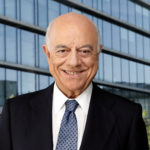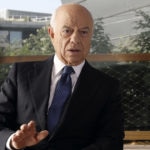Francisco González: "Carlos is the best leader for BBVA"
On December 31, 2018, Francisco González will step down as BBVA Group Executive Chairman, after 18 years at the helm of the bank and almost four more as Chairman of Argentaria. Following the Board’s announcement regarding the approval of the chairman’s succession plan, we sit down with him for an hour to talk about the meaning of his decision.

Francisco González arrives right on time for the interview, ready to make the most out of it, just as he always does with all his appointments. This respect for other people’s time, and discipline, are two of the defining traits of Francisco González’s (Chantada, Lugo, Spain, 1944) personality. Discipline has always been a constant in his life: He prepares for meetings in advance, sticks to a healthy diet and a daily exercise program, sleeps at least seven hours, and spends his weekends with his family… except when he’s at the golf course. “Workdays are pretty intense at BBVA, you can’t keep up if you don’t take care of yourself,” he says.
Q: Why has the Board of Directors decided that it was the right time to make such a transcendental announcement? According to the Board’s regulations, your term could’ve been extended through March 2020.
A: I believe that when dealing with some truly important issues, it is not advisable to wait for the last minute. This is a decision that the Board was able to make now because we understand that Carlos is the ideal leader to plough ahead with a transformation project that has already propelled BBVA to the top ranks of the sector worldwide, and which is the result of the years-long efforts by thousands of people across the globe. This change guarantees the continuity of the strategy and that the greater project will continue advancing. The Board has been working on the succession plan for quite a while. It is what we had to do, because making a change like this has to be thought through very carefully, without rushing. Once the path was clear, there was no reason to postpone the decision.
Q: Can a businessman with a track record as intense as yours really quit working?
A: Well, I still have a few months ahead to decide what I’ll do, but what I am already certain about is that I won’t be holding any positions of responsibility here. Making room for the new team is not only essential, but also logical, taking into account the bank’s high standards of corporate governance. For the time being, I’ll be able to spend much more time with my family, because the job has required me to give up a lot of time with them. I’m also very interested in new projects by young entrepreneurs, and I believe that my experience can help them. But we’ll see, it’s still far too early for make a decision. But I’ll keep busy, that’s for sure. I have to reinvent myself, which is something I’ve always done.
"Today, BBVA, thanks to everyone’s work, has a very strong reputation, built on extremely solid principles and values"
Q: In hindsight, how would you describe your professional career?
A: Maybe it’s better that others comment on that. Personally, I know I’ve been very lucky. I think change has been a constant in everything I've done. That’s why I was talking about reinventing myself before. I’ve moved between countries, I quit a great job in Germany to try my luck in Spain; I’ve switched industries, I started my career as computer programmer and then changed to financial services, from a monopoly to the free market; from employee to public servant, from public servant to businessman, from businessman to manager in a multinational company. And all this in the context of the unprecedented change, at all levels, that the fourth industrial revolution has unleashed. But of all the things I’ve learned over the years, the three most important ones would be: the importance of principles; the importance of the market and meritocracy as mechanisms that help society advance and improve well-being in general; and the importance of committing to innovation as the best way to underpin progress.

Francisco González: "Carlos is the ideal leader to plough ahead with a transformation project that has already propelled BBVA to the top ranks of the sector worldwide."
Q: And what do you think is the most important thing a company leader must do?
A: A company needs to have a clear roadmap. We set off on our transformation journey over a decade ago and that helped us get an early start. I’ll always remember the faces of surprise long ago when I started talking about the impact of technological disruption in meetings with global bankers and supervisors. Today, everyone’s talking about it. Having a clear strategy is essential. As is persevering. A project is worthless if you don’t follow through, persevere, if you start having second thoughts as soon as you hit a rough patch. And coming up with a spot-on vision can be relatively easy. It’s in the execution where the complexity lies. Today, BBVA owes much of the privileged position it enjoys to this anticipation. For me, another absolutely key element is sticking to principles in everything you do. There is no other way. At BBVA we established three very simple rules: everything we do must be publishable; everything must be legal, and this means no shortcuts to secure bare minimum compliance and no exploiting legal loopholes; and everything we do must be morally acceptable for society. Today, BBVA, thanks to everyone’s work, has a very strong reputation, built on extremely solid principles and values. Another key factor for me is independence. Knowing how to say no and letting technical teams take the lead. And this leads me to another essential aspect: the balance of power. A governance model that prevents the concentration of power is essential. I’ve never taken part in a decision regarding a loan application, regardless where it came from. At BBVA, what technical teams decide and propose is what gets done. And to build good teams, meritocracy is critical. Having the best people. And this means having teams that challenge you, with different views, with complementary experiences, whose careers advance due to their achievements.
"I reckon that since I joined BBVA I have traveled the equivalent of circling the globe about a hundred times"
Q: What is it that you’ll miss the most?
R: The team. I have been blessed with the opportunity to work with a stellar team. Today, my collaborators are able discuss topics such as cloud computing, artificial intelligence, blockchain, quantum computing, agile methodologies, scrums and so on, with a level of detail that just overwhelms me. We have teams working on what will happen in five and ten years. They are the best and I will surely miss them. I will also miss all the traveling. Not so much the travel itself, but the opportunity to keep learning, being exposed to so many different realities. I reckon that since I joined BBVA I have traveled the equivalent of circling the globe about a hundred times. Travelling is essential if you want to understand the dynamics at play outside your environment, to understand new realities, deal with different visions, understand where the world is heading and how that can impact your closest reality. Curiosity and the desire to learn, are essential.
I will miss many of those things. But I am happy to leave knowing that Carlos is the best leader for BBVA. And the Board is also certain about this. Carlos, with everyone’s help, is going to achieve great things.
Our time is up and Francisco González is off to his next appointment, carrying his briefcase. The same one he’s kept by his side all his professional life. “My daughters have asked me many times to get a new one. But I refuse. We're stuck with each other until the end."

Francisco González's briefcase. The same one he’s kept by his side all his professional life.
Additional information
Born in Chantada (Galicia, Spain) in 1944.
He graduated in Economic and Business Administration from the Complutense University in Madrid. Francisco González is also a licensed stockbroker in Spain (top of his class in 1980) and a trader with the Madrid Stock exchange.
Before becoming BBVA chairman, he was chairman of Argentaria from 1996 to 1999, where he spearheaded the integration, transformation and privatization of a diverse group of state-owned banks. Prior to joining Argentaria, Francisco González founded the Securities Firm, FG Inversiones Bursátiles, which became the first independent brokerage firm in Spain. He began his professional career in 1964 as a programmer in an IT company. His ambition to transform banking with the support of new technologies dates back to this time.
Francisco González is a Member of the Board of Directors of the Institute of International Finance (IIF), where he is also a Member of its Executive Committee.
He is a Member of the European Financial Services Round Table (EFR), the Institut International D'Études Bancaires (IIEB), del International Advisory Panel of the Monetary Authority of Singapore (MAS), and the International Business Council (IBC) of the World Economic Forum (WEF). He is also a member of the Global Advisory Council of The Conference Board (TCB) and he represents BBVA in the International Monetary Conference (IMC).
He is Chairman of the Fundación BBVA, Member of the Princess of Asturias Foundation Board of Trustees and a Trustee of the Victims of Terrorism Foundation and of the Teatro Real of Madrid Foundation, where he is also Vice Chairman of its Board of Benefactors.
He represents BBVA in the Board of Trustees of the Pro CNIC Foundation, the Princess of Girona Foundation, the Elcano Royal Institute of International and Strategic Studies Foundation, and the Foundation for Help Against Drug Addiction (FAD). Besides this, he represents the BBVA Foundation in the Board of Trustees of the Spanish National Cancer Research Foundation (CNIO) and the Vall d’Hebron Institute of Oncology (VHIO).
He is also member of the Board of Trustees of the Pro Royal Spanish Academy Foundation (Pro RAE), the Board of Trustees of the Carolina Foundation, the Royal Board of Trustees of the Prado National Museum and the Board of Trustees of the Student Residence Foundation and the Board of Distinguished Patrons of Casa América.